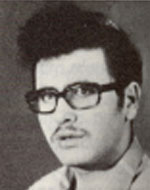Avner, son of Bluma and Abraham-Yehoshua, was born on the 21st of Tishrei 5711 (2.10.1950) in Haifa. He studied at the Yavneh Elementary School in Ramat Gan and completed his elementary studies in the Tafferet Education in Bnei Brak, where he studied at the “Yeshiva of the South” in Rehovot, Avner was the eldest son of Efrati, the first of two sisters and two brothers. He was educated on the love of Israel and the love of the homeland, and he turned those values into a way of life: From an early age, he knew how to be loved by people and was able to buy him true friends everywhere and in any society. He excelled at the highest grades in his class, and by the time he reached fifth grade his grades were “very good” and “excellent” After his arrival at the eighth grade of the elementary school, his teachers recommended that he be released from the eighth year, and even before he became a bar-mitzvah, he went to the “Yeshiva of the South” yeshiva in Rehovot, where he also excelled in his conception And his teachers and educators admired him as a student and respected him as a human being, and Avner was often referred to as the “great-generation.” Avner’s approach to life, like his approach to studies, Was thorough and profound. He has worked extensively on philosophy and has written a number of articles on such topics as “justice,” “Zionism,” and “the Holocaust and the resurrection.” The values he acquired in his home and in the yeshiva were quick to implement in reality and he tried to integrate them in practice into his daily life. Avner was one of those students who study Torah for its own sake and do not turn it into an ax to dig into. If there was any slight doubt about her difficulties, he encountered others in his studies, asked teachers and experts, and did not leave the matter until he found a solution that provided him. Love of people was a second nature. When he arrived at the “Southern Yeshiva” and is still not thirteen years old, he chose to live in one room with a boy who had polio, so that he could help him. Much of his free time was devoted to this boy and he would treat him as though he were his brother. At the same time, he did his actions modestly and modestly, as if they were taken for granted. Avner was also a devoted son to his family. The commandment to honor a father and mother was a pleasure, and not necessarily a duty to fulfill. When his father was wounded in Sinai in 1967 and was hospitalized in the central hospital in Be’er Sheva, Avner did not move from his bed. For four long months he sat at his head and encouraged him in his recovery. At the same time, the Eilat Navy was hit by an Egyptian attack and its survivors were flown to the hospital where his father lay. That night Avner worked tirelessly and unceasingly in transporting the wounded and providing help to the medical staff. Avner was drafted into the IDF at the end of July 1968, and with members of the “Modi’in” nucleus of the ultra-Orthodox youth movement “Ezra” volunteered for the parachute Nahal. After successfully completing basic training, he completed a period of service in one of the farms together with members of his nucleus. Because he excelled in his talents, his commanders sent him to a course for squad commanders, and immediately after he finished there successfully, he was sent to the officers’ course. He was an excellent commander and was respected by his commanders. The opinion they wrote about him gave him very high grades. Despite his success in the army, Avner decided to be released at the end of his regular army service to attend university. After his discharge from the army, he married his girlfriend, Ahuva Glaster, and began studying law at Bar-Ilan University. At the end of September 1973, Avner went to reserve duty as commander of the “Maverk” stronghold near Kantara, and the Yom Kippur War found him in this stronghold. On the 6th of Tishrei 5734 (October 6, 1973) Avner fell during the conquest of the landBy the Egyptian army. He was brought to Israel’s tomb in the Kiryat Shaul cemetery. He left behind a wife, parents, brother, and two sisters. At the time of his fall, his wife was pregnant, and four months later his daughter Avigayil was born. In the course of the battle of the stronghold, Avner was awarded the “Medal of Valor” and the certificate stated: “When the fighting broke out, a large Egyptian force stormed the stronghold of Mervak south of the city of Kantara, and under heavy artillery cover, Commander of the outpost, organized his men for combat, and he himself moved from position to position, for many hours, to encourage the people and help them. Despite being seriously injured, he refused to evacuate. He ordered his soldiers to change positions, while he himself remained wounded in the position, within a few meters of the Egyptian force, to cover up his men – until he was killed. This prevented the Egyptian force from penetrating the Lev of the outpost in a number of hours, allowing some of its soldiers to escape. In doing so he showed courage, resourcefulness, and above all sacrifice and personal dedication to his soldiers and his role. “
